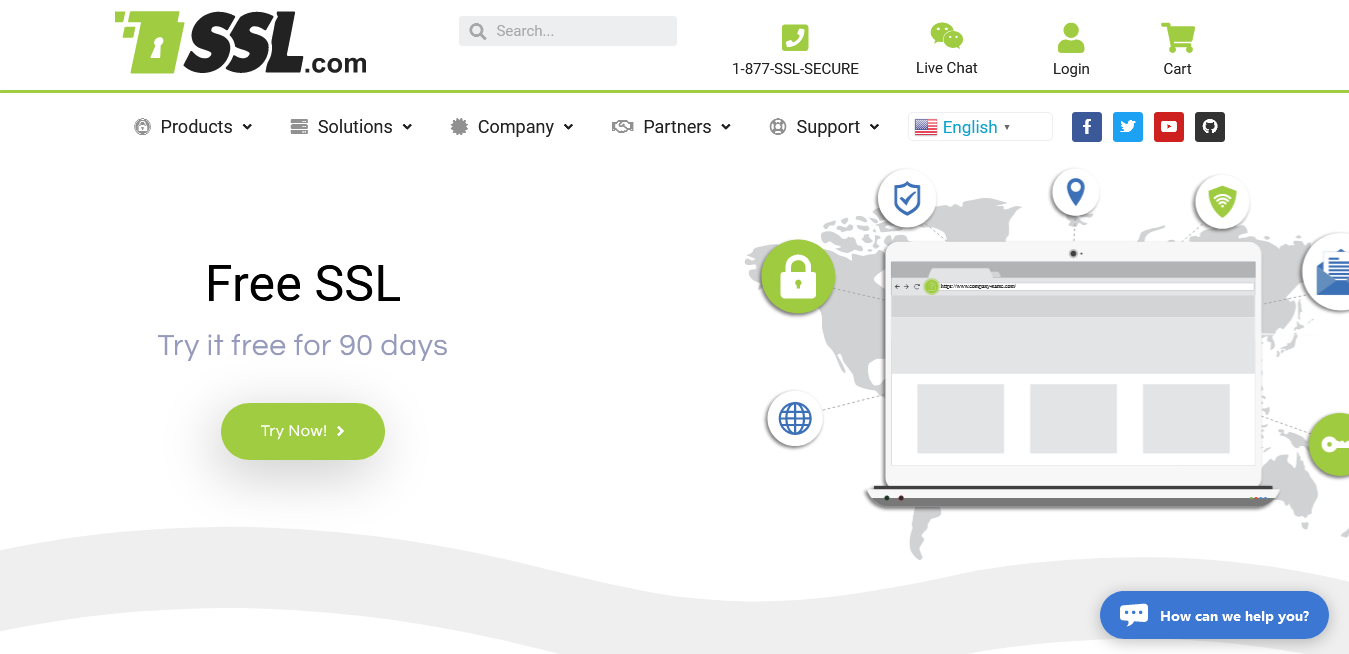What is SSL?
SSL stands for Secure Sockets Layer, it is used to establish a secure or encrypted connection between the user’s website and server.
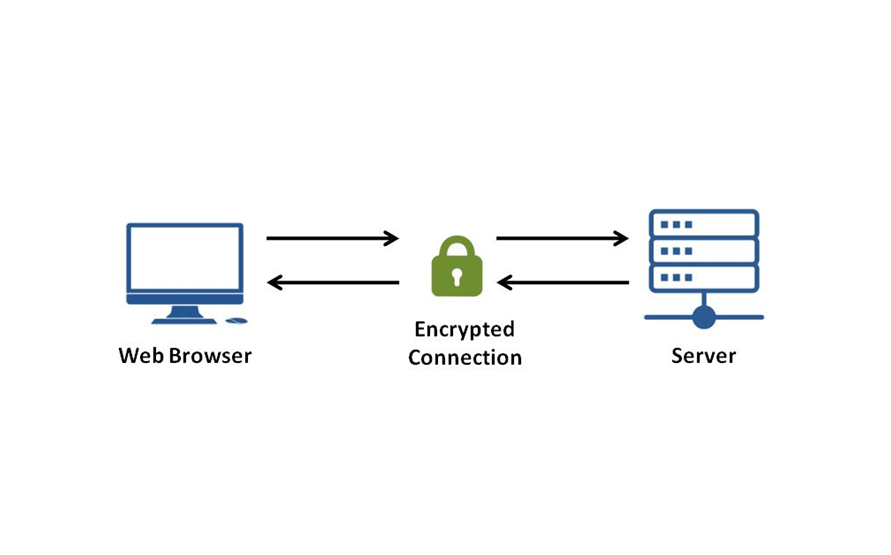
What is a Free SSL Certificate?
As the name suggests, free SSL Certificate can be issued free of cost. It doesn’t have any price tag associated with it. Various sources are available on the internet which provides you free of cost SSL Certificates. Free SSL Certificate comes with Domain Validated SSL Certificate only. It doesn’t have provisioned for EV and OV SSL Certificates.
There are two types of free SSL Certificates, in the first type, the certificate is signed by the issuer themselves that is why it is known as a self-signed certificate. In another type the CA sign those certificates and provides the same level of authentication as provided by the paid SSL Certificate. But, self-signed certificate was not verified by the Certificate Authority (CA), they prompt web servers to show the alert message to advise the clients to leave that page for security reasons.
SSL Certificate sometimes called Digital Certificate. It is used to establish a secure and authenticated link or connection between the website and its corresponding server. SSL Certificate helps to secure your sensitive data transferred over the network. It establishes an encrypted connection to secure your sensitive data such as credit card number, login credential and social security numbers etc.
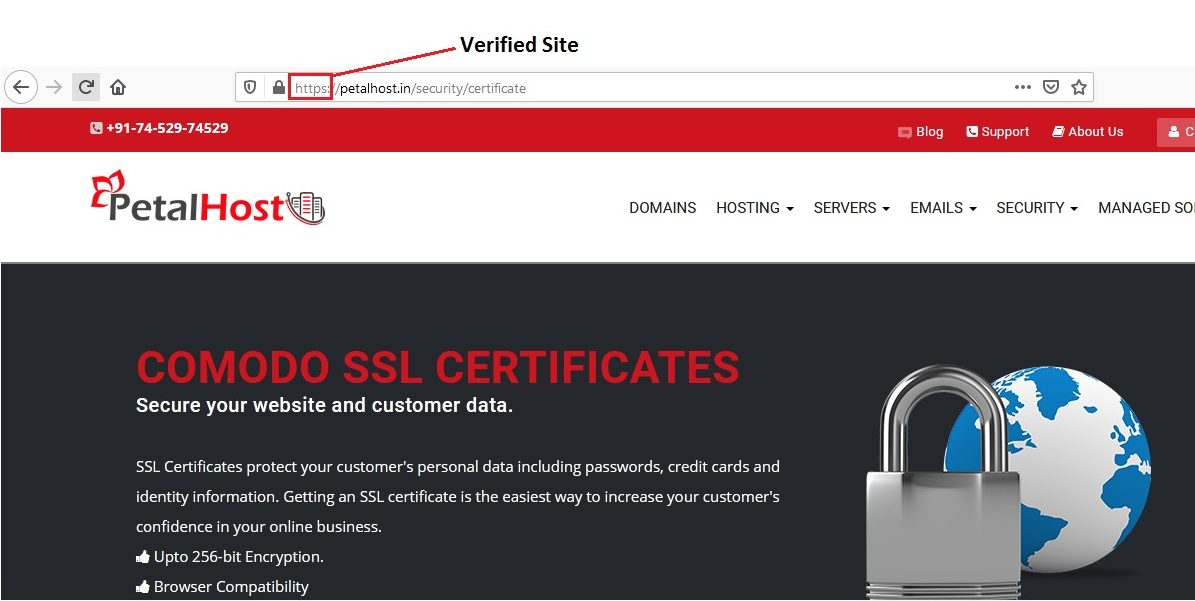
The above screenshot shows that this site is verified and it is using HTTPS rather than HTTP. That means the certificate is verified. If any site uses HTTP instead of HTTPS that means that the site is not secure.
Why do We Use SSL Certificate?
# Provides Authentication
SSL Certificate provides authentication. If the website is authenticated then you will be sure that you are connecting and sending information with a secure server. SSL Certificate provides security so that no one can pretend to be your website and get someone’s personal detail and misuse that detail. After so many identification processes SSL provider will issue you a certificate. Verification processes vary from one SSL Certificate to another.
# Trustworthy
This certificate helps you to recognize which site is secure and which is not. If a website contains a padlock sign that means it is a secure site otherwise that site will not have SSL Certificate. If an address bar showing you “Not secure connection” that means it doesn’t have an SSL Certificate. HTTPS helps to protect you from phishing attacks.
# Protect Data
In simple words, protection of data means if a client sends information to the website then no one else can see your data except the intended recipient. When we send sensitive data over network SSL helps to protect it against attacks such as phishing, man-in-the-middle attack etc. and sensitive data can be credit card number, username and passwords etc.
How does SSL Certificate Work?
When a browser wants to access the SSL Certified website, then SSL connection is established by a browser and the server by using “SSL Handshake Process”. This process will be invisible to the user.
To set up SSL connection three keys are used, i.e. Public Key, Private Key and Session Key. If you are using a public key to encrypt the data then this data can only be decrypted by the private key and vice-versa.
Encryption and decryption are performed by public and private key respectively, so it uses lots of processes during SSL Handshake Process to create a symmetric session key. Once the secure connection is accomplished the session key is used to encrypt the data which is transmitted over the network.
After completing the handshake process, a secure connection between browser and server will be established then both can communicate securely over the network.
- First, the browser checks the SSL/TLS certificate of a website which is to be visited.
- During the SSL Handshake process, the browser checks whether the SSL Certificate is valid or not and ensures the authentication of the website.
- All SSL Certificates include Public and Private Key. Both keys are used to encrypt and decrypt the data so that a secure connection can be established.
- Once the client confirms the certificate’s validity, then a session key will be generated by the client and the website’s server as a reminder of a secure connection. It is a more efficient form of encryption that makes faster communication.
- At last, you can communicate securely with the corresponding server.
Types of SSL Certificate
Below are some types of SSL Certificates, if we talk about free SSL Certificate then it only comes with Domain Validated Certificate (DV SSL). On the other hand, with paid SSL Certificate, it comes with OV and EV SSL Certificates.
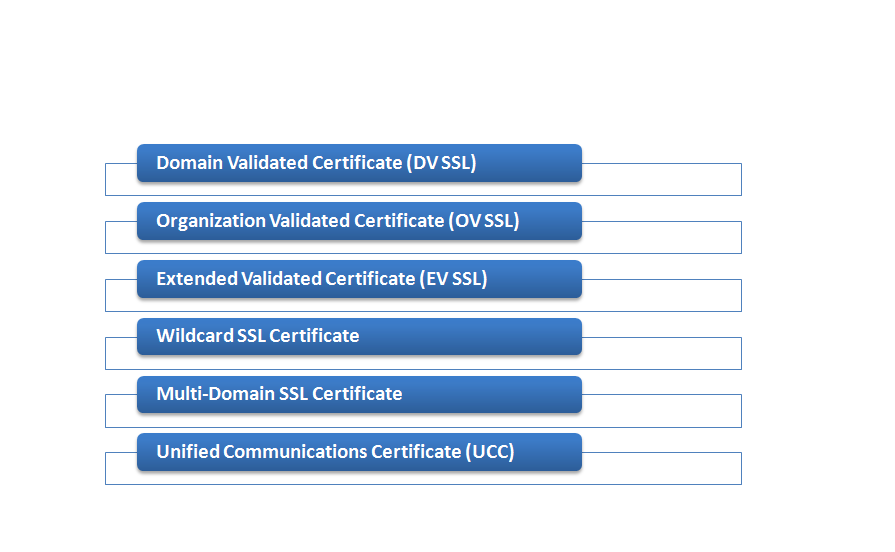
# Domain Validated Certificate (DV SSL)
DV SSL is efficient for blogs or informational websites. CA can issue this SSL certificate within minutes. For this, the website owner needs to prove domain ownership by giving a response to the email or phone call. Once you have proved your domain ownership you’ll get your SSL certificate within minutes.
# Organization Validated Certificate (OV SSL)
The main objective of OV SSL Certificate is to encrypt the user’s data which is transmitted over the network. It helps to show the owner’s information in the address bar to make it clear that it is not a fake site. Commercial websites need to have OV SSL Certificate to keep information secure from attacks. CA verifies the website owners to check their authentication, i.e. to check whether they have the right to access that particular domain or not.
# Extended Validation Certificate (EV SSL)
It is the most expensive SSL certificate as compared to DV and OV SSL Certificate. Once the EV SSL Certificate has been installed, it will show padlock, HTTP, business name and country in the address bar. While setting up the EV SSL Certificate it is necessary for website owners to verify their identity to confirm that they are authorized users and have the right to access a specific domain.
# Wildcard SSL Certificate
Wildcard SSL Certificate is used to manage base domain and multiple sub-domains. It’ll be beneficial to purchase Wildcard SSL Certificate rather than buying various certificates which support a single domain.
You can apply SSL for *.domain-name.com if you want to protect a domain and its sub-domains.
# Multi-Domain SSL Certificate
As the name implies, it can help you to secure multiple domains up to 100 different domains and sub-domains. You’ll have control of the Subject Alternative Name (SAN) field to add, update and delete any of the SANs when require.
# Unified Communications Certificate
It is specially designed for MS Exchange and Live Communications Servers. It is also considered as Multi-Domain SSL Certificate. By using UCC any organization can secure more than one domain name. It is organizationally validated and shows a padlock in the address bar.
Paid vs Free SSL Certificate
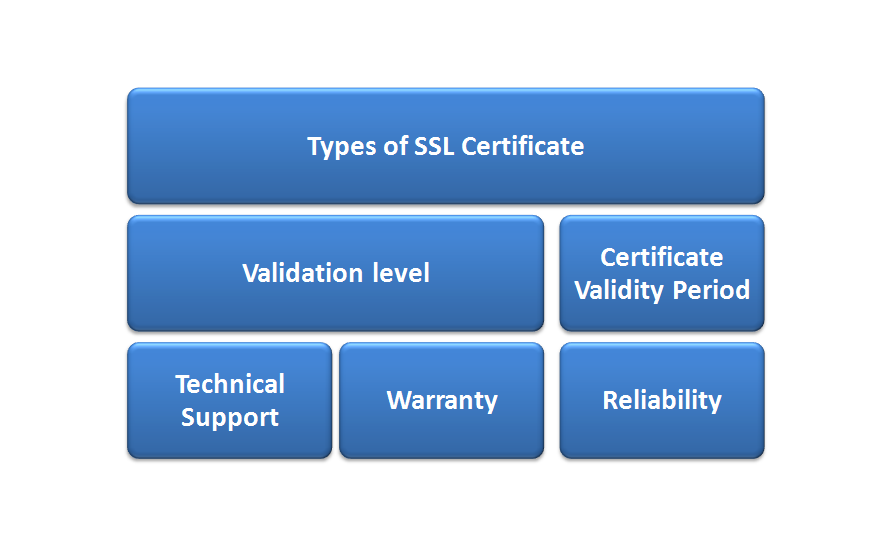
# Types of SSL Certificate
Paid SSL Certificate supports different types of SSL Certificates such as Extended Validated and Organization Validated, on the other hand, free SSL Certificate doesn’t support various SSL Certificates except for Domain Validated SSL Certificate (DV SSL). As we know DV Certificate offers a basic level of authentication.
# Validation level
In the case of free SSL Certificate, CA will verify the identity of the website owner through email or phone call. Domain validation is the easiest process as compared to OV and EV. Whereas, in paid SSL Certificate, CA will deeply identify the website owner’s identity in the case of OV and EV SSL Certificates. In the OV and EV validation process, CA will verify the required documents.
# Certificate Validity Period
In free SSL Certificate, CA issues the certificate for 30-90 days for trial. Whereas in paid SSL, CAs can be issued SSL Certificate for a period of 1-2 years, after that you need to reissue or renew the certificate. So, in the case of free SSL, the validity period is less as compared to paid SSL.
# Technical Support
In paid SSL, you’ll get 24/7 technical support, it’ll be up to you what type of support you want whether it would be through chat, email or phone call. In the case of free SSL, they don’t provide you 24/7 technical support because they can’t afford it and due to shortage of resources they will not be able to offer you full-time customer support.
# Warranty
If something goes wrong at the CA’s end then they provide a substantial amount of warranty but it is only possible with paid SSL Certificate, in the case of free SSL they don’t give you any warranty if anything goes wrong at CS’s end.
# Reliability
As we have discussed earlier, free SSL comes with domain level validation only. If you want OV or EV then this is not appropriate for you, then you must go with paid SSL. OV and EV SSL provide you visual clues such as the business name in the URL, certificate information, whereas free SSL doesn’t offer you these features. So, paid SSL is more reliable as compared to free SSL.
Advantages of Free SSL Certificate
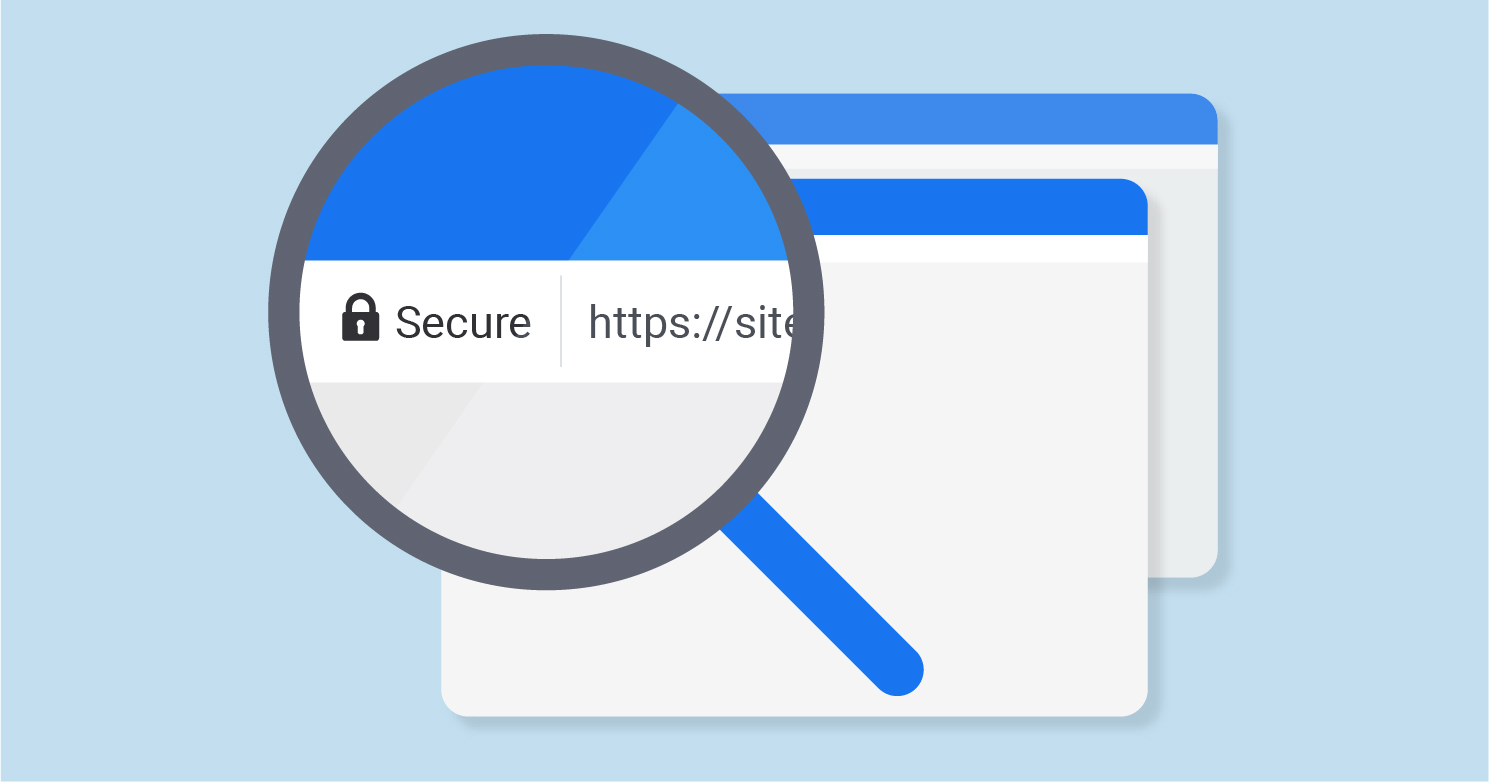
Free of Cost: Obviously, it is the main advantage that you can have an SSL Certificate free of cost.
Easy to install: It is designed to provide you with HTTPS encryption, and it is easy to install as compared to traditional methods. Most of the providers enable you to install an SSL Certificate on one click.
Secure: It offers you a secure link between the browser and the webserver.
Disadvantages of Free SSL Certificate

Supports domain validation: It has provisioned only for Domain Validated SSL. It doesn’t have provision for EV and OV SSL Certificates. It is suitable for small websites or personal blogs, but what about large projects? Here is the drawback, for large projects it needs to support at least organization validation. Domain validation is highly efficient only for small websites.
Limited validity period: It has a limited validity period as compared to the paid SSL Certificate. It is issued only for 30 to 90 days whereas paid SSL Certificate is issued for 1-2 years. In free SSL Certificate, after 30-90 days you have to reissue and install a certificate.
Less reliable: As we know that it only supports domain level validation, so it doesn’t provide you with visual indicators such as green address bar and better site seal etc. to get more attention and trust from the customer side. Through OV and EV SSL Certificates you can deliver green address bar and well-placed site seal, but it is not possible with free SSL Certificate you have to purchase OV or EV SSL Certificate.
Limited customer support: If we compare free SSL Certificate with paid SSL Certificate then it is clear that paid SSL gives 24/7 customer and technical support.
Warranty: If something misshapen at the CA’s end then there will be no warranty of this failure, whereas in the case of paid SSL Certificate they offer you a warranty if something goes wrong at the CA’s end.
Free SSL Certificate Sources
If your site is based on financial transactions then you should have SSL Certificate associated with your site. It creates an encrypted link between a web browser and a web server. It protects visitor’s sensitive data from data breaches. If you have SSL Certificated installed on your website then your users will more trust in your services.
Here are some sources which can provide you with a free SSL certificate:
- Let’s Encrypt
- Comodo
- Cloudflare
- SSL For Free
- GoDaddy
- GeoTrust
- GoGetSSL
- Instant SSL
- Basic SSL
# Let’s Encrypt
Let’s Encrypt was developed by Linux Foundation and it is sponsored by Cisco, Site Ground, Akamai, Mozilla, Facebook etc. It offers you free SSL Certificate. But these certificates are valid for three months.
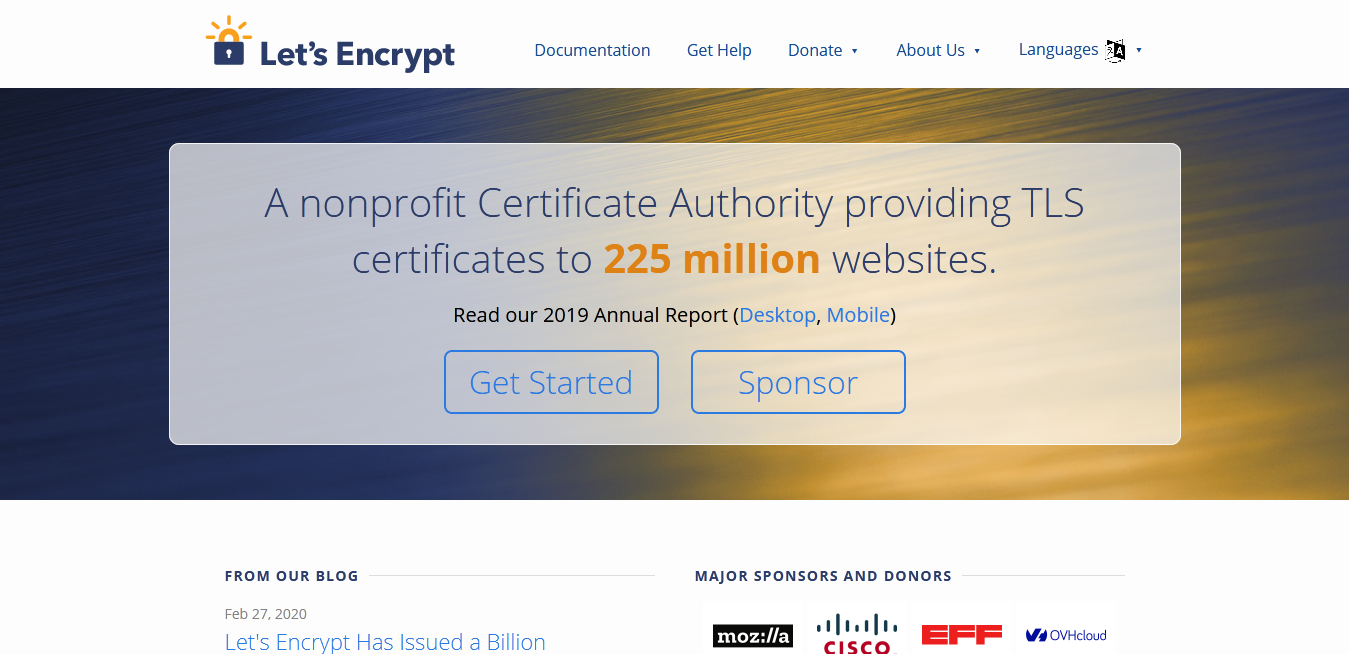
# Comodo
Comodo is identified by all major browsers and it offers you 30-day free trial for SSL Certificate. It is designed for MS Exchange and Office servers. It provides you with unlimited server licenses with priority phone support. The most important thing about Comodo that, it is certified as Best Seller of SSL Certificate.

It offers you full security, it can issue you a certificate within minutes via an online process without any paperwork.
# Cloudflare
Cloudflare is a CDN (Content Delivery Network) and Security company and recognized by top websites such as Mozilla, Reddit, Stack Overflow, Yelp etc. It makes available free SSL Certificate for all users. If you want to get free SSL Certificate then follow these steps:
- Log in to Cloud Flare
- Choose a website for which you want to get free SSL Certificate
- Click on Crypto icon
- Make sure it is configured as “Flexible” and show status as “Active Certificate”
Cloud Flare provides protection against millions of attacks and offers 24/7 customer support.

# SSL For Free
SSL For Free is a non-profit Certificate Authority (CA), and it is used by all major browsers. ACME helps to generate these certificates by using domain validation. After the creation of a document is done, the private keys will be deleted.
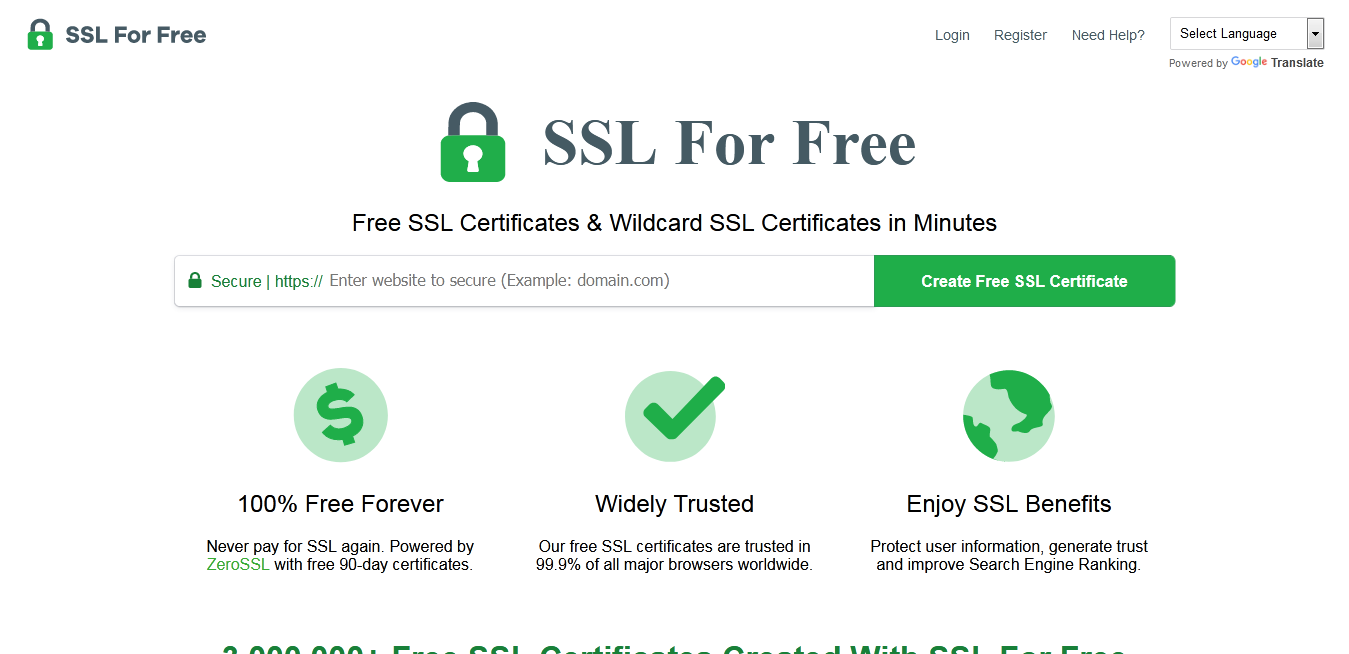
# GoDaddy
GoDaddy offers you free SSL Certificate which will be valid for one year. If you have open source project then GoDaddy will be the best option for you.

# GeoTrust
Geo Trust offers SSL Certificate free for 30-days. It offers:
- Automated domain name validation
- Easy to install
- Issue certificate in less time
- Compatible with all major browsers
- Compatible with all mobile browsers

# GoGetSSL
GoGetSSL also offers you free SSL Certificate for your website. If you choose free SSL Certificate then your SSL Certificate will be validated for 90 days. Domain validation will be done within few minutes. It offers compatibility with all major browsers such as Chrome, Firefox, Safari, Opera and Internet Explorer.
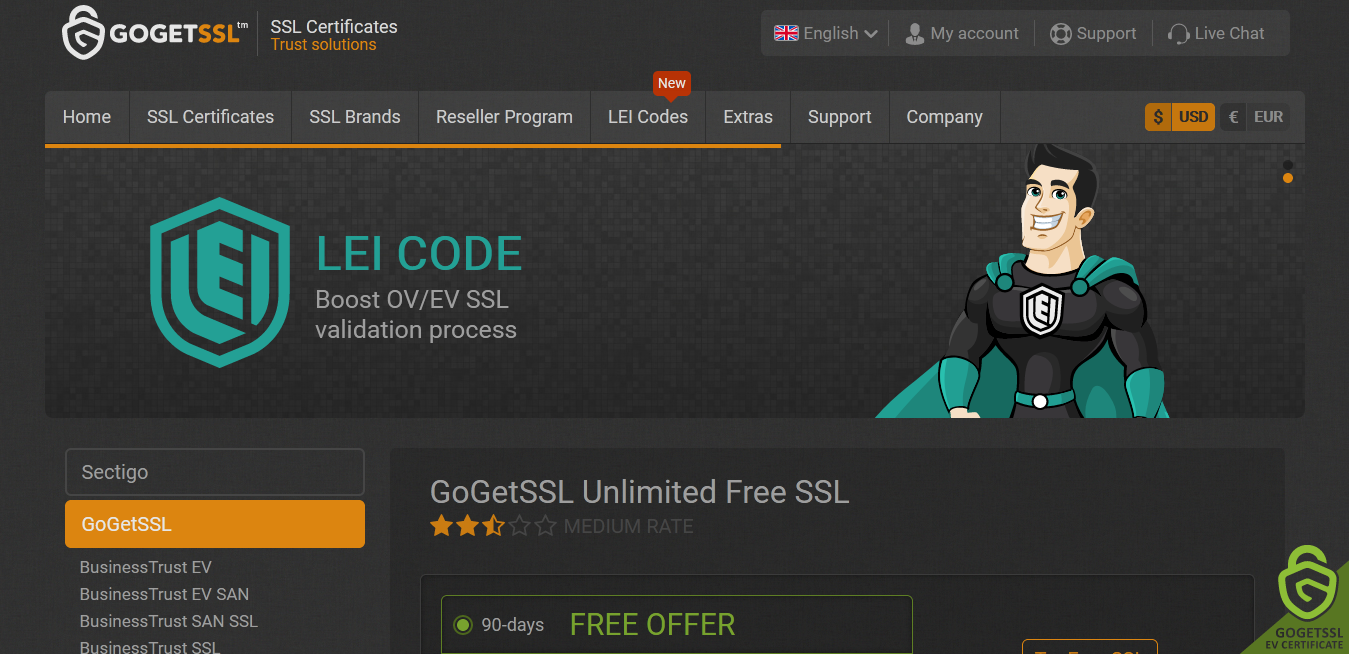
# Instant SSL
InstantSSL is recognized by all major browsers and it offers you free SSL Certificate for a 90-day trial.
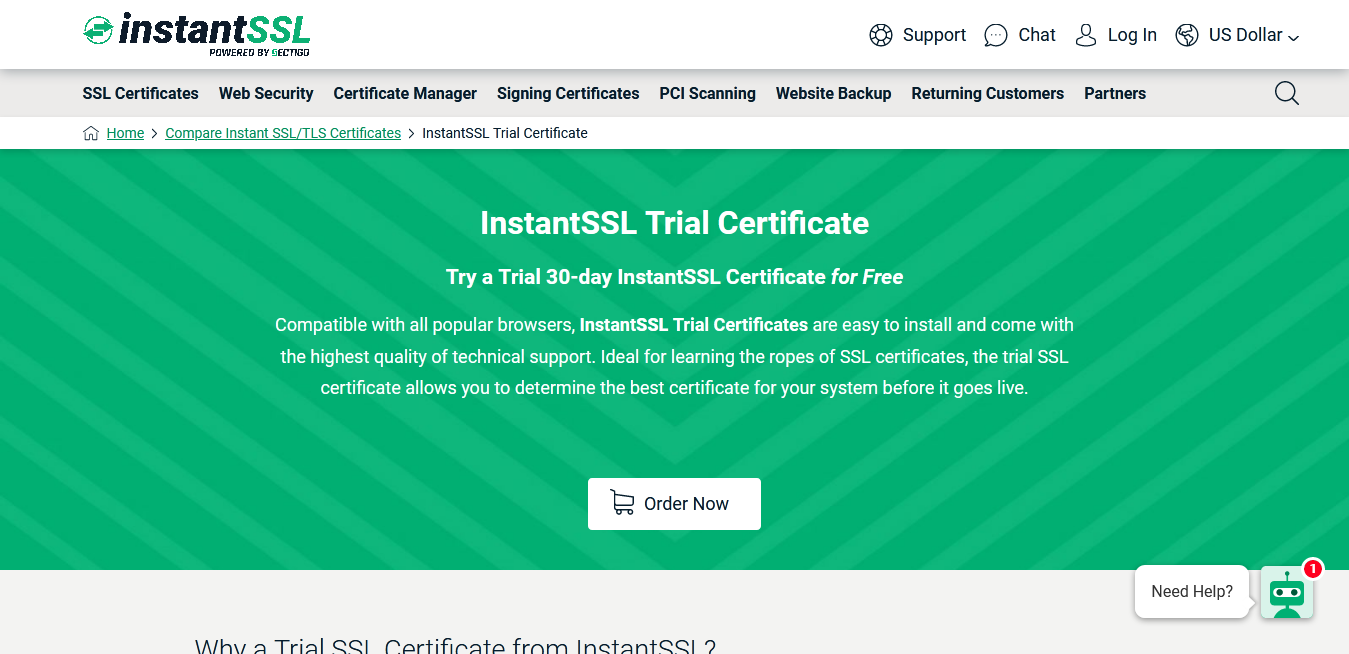
# Basic SSL
SSL.com also offers you a 90-day trial for SSL Certificate before you buy it. The validation process will be done easily and quickly.
